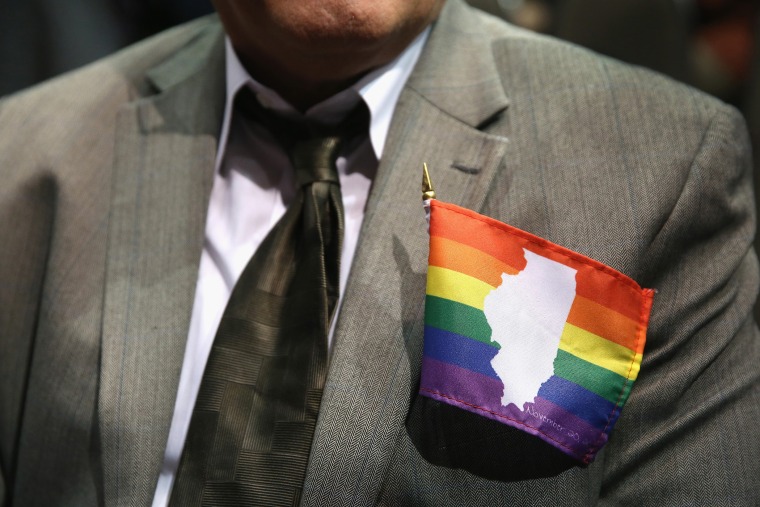Democratic Illinois State Rep. Kelly Cassidy grew up in a big, observant Irish Catholic family. So when she first came out to her mother, Cassidy's mom did what she thought was best -- she took them both to see a priest.
"He saved my relationship with my mom, we remained incredibly close until she died last year," Cassidy said. "We got to be a full part of each other's lives, because we were counselled to love each other and understand each other."
A lot of things have changed since then -- Cassidy converted to Judaism, is engaged to marry her partner, and will soon be attending her son's Bar Mitzvah. But that memory of how frightening and confusing coming out can be for both parents and kids -- and how vulnerable both can be -- is the reason Cassidy is pushing for Illinois to become the next state to ban "conversion therapy," in which people are counselled to change their sexual orientation, for anyone under the age of 18. The priest who helped save Cassidy's relationship with her mother didn't sugarcoat Catholic doctrine opposing homosexuality, but he also didn't tell her that all she needed to do was stop being attracted to women.
"He was very clear about that, he was also very clear that the Catholic Church says we need to love each other," Cassidy said. She emphasized that her bill "in no way interferes with anyone else who wants their child to speak to a faith leader."
Cassidy's bill states that "no mental health provider shall engage in sexual orientation change efforts with a person under the age of 18," and that "any sexual orientation change effort attempted on a person under the age of 18 by a mental health provider shall be considered unprofessional conduct and that a mental health provider found to have engaged in a sexual orientation change effort shall be disciplined by the licensing entity or disciplinary review board with competent jurisdiction."
"Frequently parents aren't going to know what to do and are going to turn to mental health professionals," said Cassidy. "They need to use science in their practice, and not mislead families and abuse children."
The belief that people could change their sexual orientation through force of will or faith has been a staple of the anti-gay rights movement, a lingering manifestation of an earlier and erroneous psychological belief that being gay is a form of mental illness. Conversion therapy has been criticized by medical health professionals as useless if not actively harmful. It is opposed by the American Medical Association, the American Psychological Association, the American Academy of Pediatrics and the American Psychiatric Association. The World Health Organization released a statement in 2012 saying that "services that purport to 'cure' people with non-heterosexual sexual orientation lack medical justification and represent a serious threat to the health and well-being of affected people." In 2012, Robert L. Spitzer, the psychiatrist whose research the "ex-gay" movement had seized on, recanted and apologized for the harm his work had caused.
The overwhelming medical consensus is that conversion therapy doesn't work, and can actually cause harm. California has banned it for minors. New Jersey Republican Governor Chris Christie, an opponent of same-sex marriage rights, signed a similar ban into law last year. A federal court recently upheld California's ban, and other states besides Illinois have considered following California and New Jersey's lead.
Yet some religious conservatives still back conversion therapy as a "solution" for unwanted same-sex attraction. Laurie Higgins, a cultural analyst for the Illinois Family Association, warned in a post that "If this legislation passes, children traumatized by abuse will no longer be allowed to receive counseling for unwanted same-sex attraction." The American Psychiatric Association notes that "Sexual abuse does not appear to be more prevalent in children who grow up to identify as gay, lesbian, or bisexual, than in children who identify as heterosexual."
Higgins added that "the ultimate motivation behind this legislation is to promote the Leftist assumptions of adult homosexuals who seek to wipe disapproval of homosexual acts from the face of the planet even if doing requires deception, harms children, undermines parental rights, and corrodes fundamental First Amendment speech and religious liberty."
The American Academy of Pediatrics has stated that "therapy directed specifically at changing sexual orientation is contraindicated, since it can provoke guilt and anxiety while having little or no potential for achieving changes in orientation." The Supreme Court has never held that parents have a First Amendment right to abuse their children. In its ruling upholding California's ban on "conversion therapy," the Ninth Circuit Court concluded that the ban "regulates professional conduct, not speech."
"At a time when [minors] are most vulnerable, we see them being subjected to this false, deceptive, so-called gay conversion therapy, which is harmful and contributes to their negative sense of self-esteem," said Bernard Cherkasov, head of Equality Illinois, an LGBT rights group that is backing Cassidy's bill. "Nobody should pretend this is a mental health practice and force it upon minors."
The Centers for Disease Control and Prevention has found that LGBT youth are at "increased risk" for experiencing "bullying, teasing, harassment, physical assault, and suicide-related behaviors," and "were more than twice as likely to have attempted suicide as their heterosexual peers."
Cassidy's bill was passed out of committee on Wednesday. Democrats control both houses of the state legislature, and Cassidy said she believes the bill can pass.
"We're talking about some real basic common sense," Cassidy says. "This is putting the consensus opinion of all the mental health professionals into statute."
